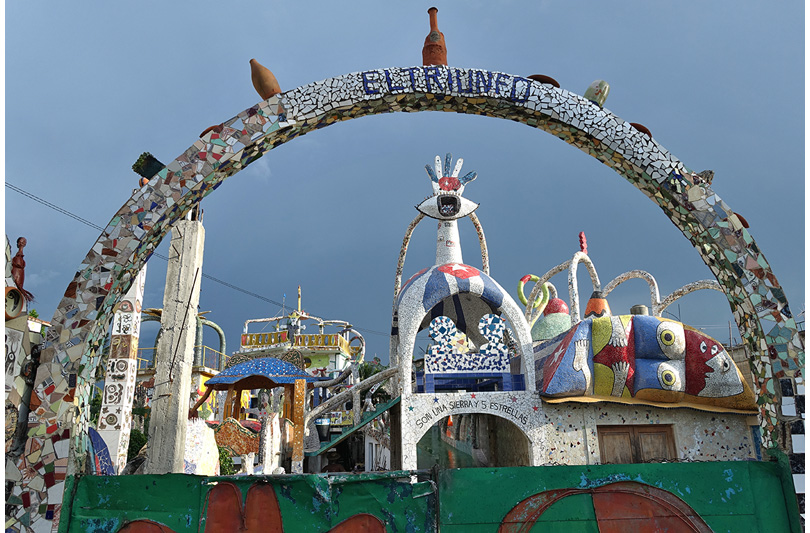The Immigration lady asked me a question I'd never been asked before, whether I had more than one passport. It took a while to get our luggage and the carousel was moving in the wrong direction. Many of the official ladies wore short minis. Long and fancy fingernails seem to be the fashion here. A variety of skin colours and no toilet on the ground floor of the terminal. From the taxi we saw a variety of revolutionary slogans and images of Che and Fidel. Hot and humid.
We had booked a room by email in a casa particular with Señora Adelaida. She told us both her rooms were taken, as she wasn't sure we were coming. Yet it wasn't a problem, as her downstairs neighbour, Sergio, was ready to accommodate us ($35 US). We spent a week with Sergio and never saw him with a shirt on. However, he was discreet, friendly and helpful. Our room had air-conditioning, but his flat did not. We had an ensuite, a private entrance and a fridge, but no windows, which was disconcerting, as we could not tell what time of day or night it was when we woke up. Our digs were comfortable enough, though not quite four-star.
We spent 20 days in Cuba, with the first week in Havana. Havana is in an advanced state of decay, though much of the old part has been nicely restored. It's funny how the 1950s American cars make Cuba exotic in an old-fashioned way. It was hot, often around 34, smelly and dilapidated, but also interesting and charming in its own way.
The Cubans are extremely extroverted, even by Latino standards. On the street we were accosted by locals trying to sell us addictive drugs (cigars) and others who just wanted to talk. All spoke in English, which wasn't good for my incipient Spanish. I decided to reply in Spanish. I caught myself trying to make Cuba more exotic than it is. People are the same the world over, yet we travel because we hope to experience something different.
Slept in and managed to score breakfast at midday. It was quite pleasant sitting on the terrace in the breeze, but a bit too hot in the sun. Carla is not complaining about the heat and I'm not allowed to complain. (Them's the rules of travel.) We strolled towards the old city, more or less along the sea. Lots of dilapidated buildings, people of all colours sitting in doorways. They are happy saying hello to us. Houses often have grilles rather than doors to let in the breeze. Butcher shops do not have fridges but employ a patented anti-fly device: a bottle swinging on a string.
I bought two glasses of fresh guava juice at a small cafe. The bill came to 10 pesos ($10 US), which seemed very excessive. Then I cottoned on that it was 10 pesos nacionales, ie 40 cents. So we can say we have partaken of the local economy, having used both currencies. Our suburb uses an admirably logical system: streets in one direction are numbered Calle 1 to Calle 29, whereas the cross streets are numbered Calle A to Calle O. So you immediately know how many blocks you need to go.
While illegally crossing a busy main road, we were nearly run over by an old car that was careering around the corner. Carla thinks the driver meant to frighten us and he certainly succeeded. She criticised me for taking unnecessary risks and was fully justified.
Carla suggested we have lunch at the emblematic Hotel Nacional, where peacocks strolled among the tables. Carla's verdict: "less than mediocre".
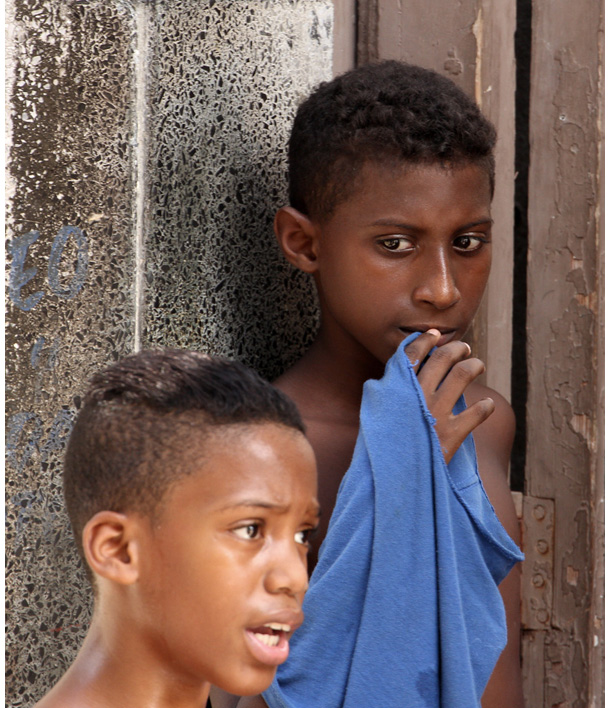
We took a newish taxi to the Old Town. It was a 30-year-old Lada, a Fiat copy. The drive was along the famed Malecon seaside promenade, which is supposed to be one of Havana's highlights, but it didn't seem special to us. The windows of the Lada were immobilised in the down position, which was just as well, as the mercury hit 35 C. In the Plaza de la Catedral we saw old black ladies smoking cigars for show. Real Cubans smoke cigarettes, as cigars are ridiculously expensive, even here. The Old Town is very self-conscious, spruced-up and full of foreigners. Cuba is about the only country where anglophone tourists are in a minority.
In the evening we walked down to the Malecon to watch the Havana Carnival, which lasts three days. Lots of music, dancing, colourful costumes, with mostly black people in the parade. There was an equally impressive electrical storm, though it was much harder to photograph than the Carnival.
Mindful of my promise to Raghu, we entered the Museum of the Revolution. It is in the former Presidential Palace, which was worth visiting in its own right. We gazed at photos, relics, propaganda texts until we were revolutioned-out. One hall was labelled "The Revolution in Power", which is surely an oxymoron.
Hoping to step into the same river twice (cf Heraclitus), we navigated to Mama Ines, for the fruit salad. Instead of stepping into a river, we got a tropical downpour. Ines was closed. Energised by the heat, we decided to walk home.
Near the end we sat down in a park. A local man aged 54 engaged us in conversation. He told us that salaries are very low and food prices are high. He has to pay for most food using the foreign peso. He acts as a tout for a restaurant and a casa particular, saying it is a struggle to make ends meet. This reminded us of communist Poland, where people could not make do with their salary but had to "kombinowac". It is conseguir or resolver in Spanish, ie work things out by bending the rules. He wants to emigrate to Florida, where his mother has been living for many years. She is happier there than in Cuba.
I think bread is not a problem as it is covered by the libreta and hence very cheap. The downside is that people have to queue up, plus the bureaucracy involved. The two currencies are freely interchangeable and you can even convert them to dollars. The problem is not with the dual currencies but with the two-tier price system. Almost all Cubans are paid low salaries in the local peso. These can be converted to exchangeable pesos, but the amounts are pitiful.
Our criterion for selecting a place for lunch was simple - it had to have fruit salad, as the mangoes here are amazing. However, I have no idea where the restaurants obtain them.
Afterwards, we took a 1952 Mercury to Jaimanitas, also known as Fusterlandia, a suburb about 15 km from the centre (see the first photo above). It has two streets that have been transformed into a Gaudi-inspired fantasy land. A single man, Jose Fuster, has transformed the modest, and in many cases, less than modest houses into a large-scale artwork, the like of which we have not seen anywhere. It was the highlight of our trip. The designs can seem crude from close-up, but they are striking and effective as street-scapes. There was a tropical downpour but it did not impact our visit. In fact, a local family invited us onto their porch and offered to make us coffee.
An old man in a T-shirt opened a gate for us to see the largest of the artworks. Like some other Cubans, he was hard to understand, repeatedly saying something about "jefe" and making a gesture as if to cut his own throat, as though he would be punished if he didn't show us around. After leaving the property and walking further, Carla pointed out that we should give him some money, even though he hadn't asked for it. The smallest I had was a 3-peso note, ie about five days' salary. On the way back Carla gave him the note. He was delighted, kissing her and saying he loved her. We probably made his week.
We didn't feel like taking a taxi on the way back, as there were buses going in our direction. The fare was one local peso, ie 4 cents. We had to wait about 20 minutes and then change buses, but it was worth it.
I counted the number of dinosaurs on our way to the bus station for Vinales, concluding that 22% of the cars on the road in Havana are US models from the 1950s. It's odd how much the old cars contribute to make Cuba seem exotic. Modern cars are so bland, uniform and boring. The bus for Vinales left on time and was quite comfortable. I don't think there were any locals on board. Cubans travel long distance in trucks or on more basic buses. When it pulled into Pinar del Rio, we were the only ones to get off. This was because I had a senior moment, confusing the town with the province of the same name. By the time I realised my mistake, our bus had gone.
However, this was Cuba. A tout offered us a ride to Vinales (24 km) for 10 pesos each in a collectivo taxi. The catch was that we would tour a cigar farm en route, for free. The passenger in the front was a young Pole, the first we had met in Cuba. The tobacco farm tour was interesting, as making cigars is an involved and complex process. Our guide said that whereas cigarettes are an addiction, cigars are a pleasure. He also told us that it is almost impossible for the workers to filch cigars because there are so many cameras installed. Also, they don't want to lose their plum jobs.
It was silly to make this mistake but it had some good consequences - seeing the tobacco farm and meeting Krzysztof. So overall I am glad it happened.
On arrival in Vinales we had no idea where to go, as we didn't even have a street number. However, by frequently asking the locals, we were reliably guided to our casa, which was the last one in town. Carla did not appreciate dragging her suitcase through the puddles. Our abode was a wooden hut with glassless windows and roof but no ceiling, so that insects pooed onto our bed. However, it was cheerfully painted in bright primary colours and had three fans.
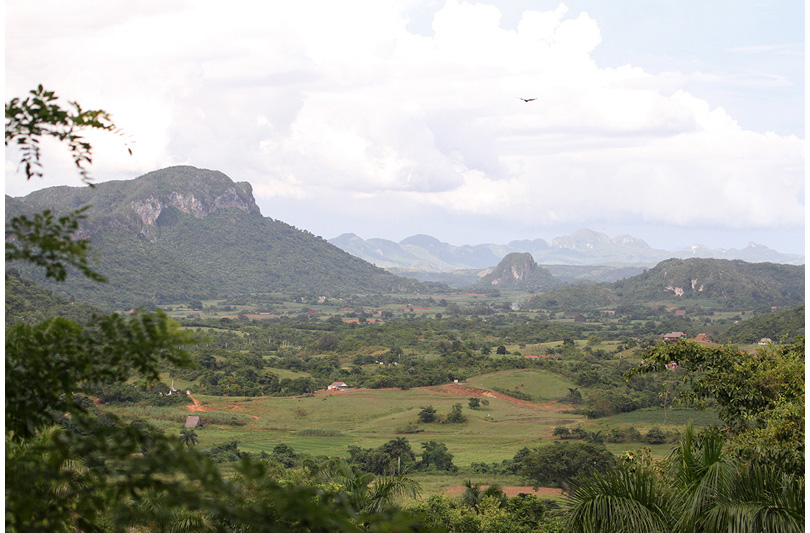
Carla says it wasn't a backpacker holiday but "close to it". Although our stay in Vinales was basic, it certainly had its rustic charms. Lots of interesting sound effects - weird cricket sounds, neighing of horses and the morning buglers. We stayed in casas particulares for a number of reasons. Firstly, we wanted to experience a bit of the "real Cuba", secondly it was a way of making sure our money went to people who needed it, and thirdly I like to save money. I also hoped to get more Spanish practice, which was the case, since they mostly did not speak English.
During our tour we stayed in five casas and one boutique hotel. The hotel was a nice interlude, but if I had my time again I would do it the same way. The owners of the casas were uniformly friendly, tactful, helpful and generous. All had ensuite bathrooms, which I presume are required by law. I believe that all tourist towns in Cuba have good hotels, where one can travel business class.
After lunch I set off for the Aquaticos, a famous but tiny (2 house) village half way up a mountain. I thought I would have no trouble getting home by 7 as it is only a 6 km walk. However, I did not notice that the walk starts 3 km from our hut, so I had 12 km to walk in less than three hours, in 34 degree heat. After taking the fork towards the mogotes (limestone outcrops), I came upon a horse-drawn cart conveying six ladies. The driver told me that he was the guide for the Aquaticos and that I could not go alone but must pay. I challenged him with, "Says who?", knowing that this is one of the few places where foreigners are allowed to walk without a guide. He ended up waving me through.
The track became increasingly steep and muddy. After a while I reached a blue house, but assumed that was not the right one. I kept on going until I came to a fence across the path, which made me realise I had over-shot. I returned to the blue house, where the lady invited me into the compound. I admired the extensive view (above) as I drank two glasses of her delicious mango juice. I had to pick up my pace on the way back, which was easier in the cooler air. I was only 18 minutes late for dinner and drank two big jugs of fresh guava juice, which were sheer delight in my dehydrated state.
We down-graded our casa from one-star to nil, as the shower, which yesterday had two settings - too hot and too cold - lacked the too hot setting today. However, life relies on contrasts. If we had luxury every day we would not appreciate it, though Carla dissents from this view.
A slogan by the road said, "Only socialism makes the impossible possible". Yet the Cuban system is unable to deliver what we take for granted, shops with goods for sale. This, and other more pugilistic slogans, so prominent after 50 years, give the impression that the ruling class feels embattled. But then, "castro" means "fort".
Our trip from Vinales to Cienfuegos was a minor adventure. Our collectivo taxi, a 1952 Chrysler, suddenly made a sound like a tin can dragging along the freeway. The drive shaft had disengaged from the differential, this at 100 kph. Surprisingly, it took only 25 mins for us and the three Czech ladies to be picked up by another vehicle, an almost spanking new 1954 model, which got us to Havana, where they transferred us to a Ford truck that had been converted into a bus that crams in 17 passengers. Not comfortable but airy. On the way, a bus-truck just in front of us had a tyre explode. I heard that the Cubans do no maintenance on their vehicles - they just drive them until they collapse and rely on mobile phones to get help. They are surprisingly well organised in this regard. Our transit was in four different vehicles, each with its own charm. The last was a huge green sedan seating eight passengers. It featured a custom-made air-conditioner that looked impressive but did not work. I wonder how they organised the payment for our transit among the four drivers.
It was Saturday night fever, and I felt like experimenting, so we ate at a "peso nacional" restaurant, ie one that charges in the local currency and at local prices. Carla was not keen, saying, "I just wanted to be in a cocoon". The food was OK, but too salty, as usual. Two young men came in with their dolled-up girlfriends in flashy mini-dresses. Luckily, Carla was also dolled-up. I'm sure the local guys were happy to see tourists imparting a patina of wealth to their night out. The bill came to $4 for two.
The next morning we walked through sleepy Cienfuegos to the bay. The water is aromatic, with many nameless substances decomposing, combining to form a complex odour. We met a friendly santeria (an African-derived religion) priest at a restaurant. I later sent him an email, to which he mailed a friendly reply.
The first thing we did was change our remaining euros to pesos. This gave us a small dose of socialism in action. There was a queue of about 20 people, mostly locals, on the steps of the bank. The staff let in a few people at a time in order to maintain the queue system. Each new arrival asks who is the last and this ensures orderly queueing. There was a big queue inside the bank as well.
Surprisingly, lots of Cubans are fat, particularly women over about 50 or so, especially the Blacks. Today was 36 or 37 and the locals complain about the heat, saying it usen't to be so hot. After dinner we looked in on the Parco Marti. In one corner young people were gathered, all of them playing with their mobile devices instead of talking. Globalisation.
At 8 am we hailed a taxi to take us to the Guanaroca Lagoon. The Lada needed a push to start and sported US and Cuban flags on the dashboard, plus a dollar note, for luck. The flags were just for decoration - not a symbol of rapprochement. The driver was hard to understand, as were many Cubans, especially when they barked one or two words out of context. At the small carpark a guide took a small group of us touristas on a guided walk to the lagoon. He showed us hummingbirds, a woodpecker, orange crabs (toxic) and a blue and yellow chameleon. Carla and I had our own boat with an oarsman-guide on the lagoon, who rowed for about 2 km. The water is only about a metre deep and in places only a few centimetres. It was not hot on the water and the Bushman kept the wildlife off Carla.
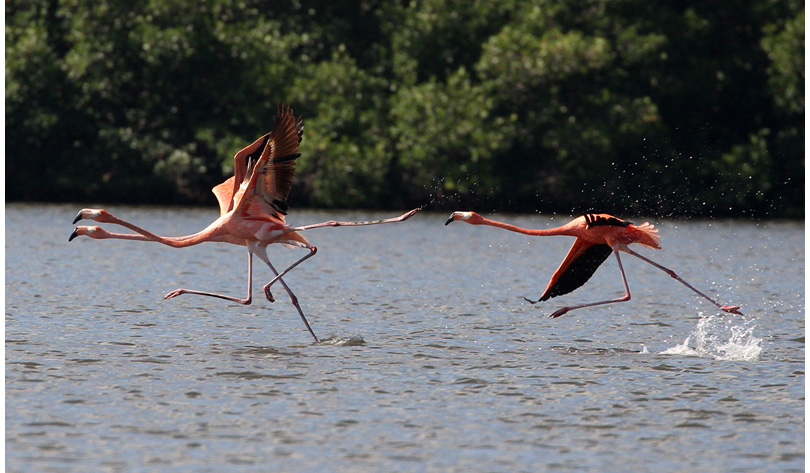 A rare, two-headed flamingo
A rare, two-headed flamingo
There were about 25 Chilean flamingoes and a few dark pelicans. I went snap-happy, taking 626 shots of the birdlife. Our guide rowed towards the flamingoes so that I could photograph them in flight. We also saw pelicans diving for fish, unsuccessfully, I think. Our guide told us that diving damages their eyes so that they eventually go blind and die. Overall a very worthwhile excursion out of Cienfuegos.
Mango orgy at breakfast. The pale yellow ones are somewhat sour and utterly delicious. Yet even then, my experience was not as blissful as the expectation. Maybe I lack the epicure gene.
We had not booked accommodation in Trinidad but we knew it to be a buyer's market. We arrived by Viazul bus and were immediately assailed by the jineteros (touts). A few doorways later, a señora asked whether we wanted to look at her guest room. It was rather pleasant, with A/C and an ensuite, so we took it.
Trinidad is a colonial gem, with cobbled streets and very little car traffic. It must have been a very rich town in the heyday of sugar fortunes. There are lots of art galleries and stately mansions. There seem to be more tourists than locals and the restaurants are better than in Havana. We chose one called Lola because it had gazpacho (very good). They also served mango juice, of which I only had three glasses, and fruit salad. We got a little lost walking back to our casa, but it was enjoyable peeking into people's living rooms at dusk. Many were sumptuously furnished.
One of my pet hates is coca-colonisation, the insidious spread of McDonalds, Starbucks, US brands, junk food and US music around the world. In that respect Cuba is a refreshing enclave, pretty much free of these irritations. I think I heard anglo-American music only twice during my 20 days in Cuba. Not that Cuba is immune to the stupidities of fashion - torn jeans have made inroads here too.
Still a la mode, are images of Che. These appear in myriad forms in souvenir shops, posters and T-shirts. Korda's photo of Che is probably the most iconic photo ever taken. It embodies idealism, determination, youth, beauty, and the seductive dream of radical change.
The Lonely Planet is carried by almost every tourist, regardless of nationality. It probably causes queues outside the restaurants it favours and has many other effects on the tourist industry here, as elsewhere. By writing about Cuba "as it is", the Planetary book changes things, cf the act of observation changes what is being observed. My apologies for this gratuitous philosophical intrusion.
The local lizards with their upswung tails make me think of a cross between a squirrel and a frog. There was a huge downpour and the streets turned into shallow and muddy streams. I took my sandals off but many locals got their shoes completely wet. Our one-hour salsa lesson finally materialised (it was on our list from ages ago) and it went rather well. My two left feet somehow remembered the three basic steps and this was to be a lasting and pleasant souvenir of Cuba. It took foreign travel to induce me to learn a dance.
The next morning I woke up at 5 AM and was driven to feverishly scribbling my thoughts on Cuba, which eventually became my article in the Havana Times.
We went on an organised excursion into the mountains near Trinidad. A brand-new four-wheel drive spirited us into coffee-growing country. We were shown how coffee is harvested and shelled, still using manual methods. Then we did a 5 km walk gradually uphill. Carla was initially fearful and would not have gone if she had known how hard it was ("moderate"), but I helped her and she was eventually glad she came. It was sticky but not hot, being mostly shaded. Near the end there was a small waterfall and a pleasant swimming hole. We had to cross a number of streams along narrow planks, all but one had a balustrade, on which Carla did well. We passed through a coffee plantation and briefly sighted a hummingbird near an impressive waterfall.
The most amazing feature was a small plant with acacia-like leaves that closes its leaves when you touch it. I didn't know plants could do that. It began to rain just before the end of the walk, which was followed by lunch. Then a downpour.
Inspired by the German girl in our vehicle, Carla ordered a lobster for dinner. The flesh had to be prized out of the shell with difficulty. The taste was so faint that Carla judged it nearly tasteless. My General Theory of Seafood is that it is a case of the emperor's new clothes. Everybody thinks they should enjoy seafood and prize it because it is so expensive. Yet the taste is either fishy or very faint.
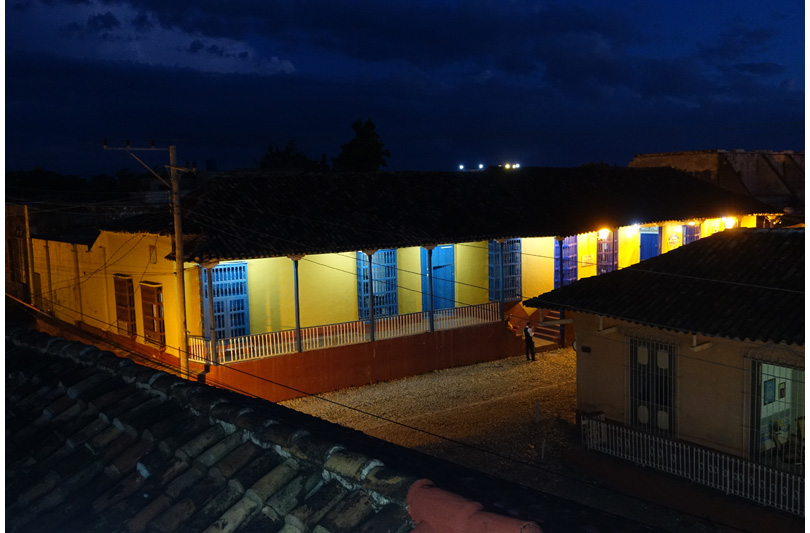
I spied what looked like a chess club in the main square of modern Trinidad. Cuba has a long chess tradition stretching back to the legendary Jose Capablanca. I played two games with Ernesto, who has a rating of 2260. Of course, I got thrashed, as my rating is more like 1400. He is hampered in his chess career by not having access to the Internet (which is far too expensive for ordinary Cubans) and no computer. Both are essential tools for aspirants to chess greatness.
We had dinner at our casa and were very full afterwards. Yet we were able to demonstrate the salsa to our señora, to her amusement.
From Trinidad we took a collectivo (as the bus was booked out) to Playa Larga, in the Bay of Pigs, though we didn't spot any mammals in the water. We shared the taxi with a young leftist French couple on their first trip outside France. We lodged at El Caribeno, which the Lonely Planet describes as a Caribbean fantasy. The narrow beach was on our doorstep, but wind and drizzle spoiled the fantasy for us. Yet worse was to come - the liquid beginnings of the cyclone season. We walked along the beach, which was fine until the mosquitoes and sand fleas made us welcome. The seawater is quite murky, as the rivers deposit a lot of silt.
We repeated the seafood disaster by both ordering crab. I had no way of breaking through the crustacean's defences and what little I extracted with the special hook was not worth the effort. Carla said, "Let's go before they realise we have made no inroads!" We made a cowardly exit.
At Playa Larga there is a bird sanctuary and I made for it along a dirt road, which was fringed by swamp on both sides. There was a fair bit of noise and movement in the undergrowth and I gradually realised it was due to large crabs foraging among the plentiful garbage. The crabs, rubbish and stagnant water gave it a surreal feel, like a post-apocalyptic science fiction film set. I saw a number of butterflies, some hummingbirds and some ibis-like birds. There were also turkey vultures on the ground (as well as in the air, as normally), picking at what little was left on the skeleton of a goat.
Forewarned, I had applied the heavy-duty Bushman lotion, which is 60% DEET. This kept the mosquitoes away from exposed skin. However, they gathered on my shoulders and bit me through my sweaty T-shirt where the material adhered to my skin. Carla later massaged cream into my welts.
We took a taxi from Playa Larga to Havana, passing through Australia on the way. Our driver picked up his family en route. His daughter wore eight gold rings and very long and fancy silver fingernails. When I asked what she was doing she answered "Nothing". With those fingernails all she can do is nothing. She also followed the torn jeans fashion.
There were a number of control points along the highway, but they seemed to be inactive, at any rate we did not need to stop. Horse-drawn carts are common on the road, mostly the two-wheeled variety. Closer to Havana, we joined the three-lane highway, which was in a reasonable state, though it could do with some repairs. Even here, there were few cars. The landscape was mostly savannah, with some trees and occasional plantations. On the entire trip we only saw one produce market, as opposed to tourist markets.
I went for a stroll along the famous Malecon seaside promenade in Havana. I was accosted a number of times, mostly in a disinterested way. However, a number of people wanted money, including a lady who suggested that she become my companion. All the Cubans seem to know Skippy, the roo.
On our last evening in Cuba we taxied to the old town to watch a flamenco performance. There are at least five flamenco troupes in Havana and they are regarded as being as good as groups in Andalusia, where the art originated. We installed ourselves at El Meson de la Flota, joining four other people. The band was there, but it seemed they might not make a start, given the poor touristic presence. This was due to the oncoming hurricane season (read "Matthew"). Things got even worse when one of the couples walked out, so that Carla and I formed half the audience.
Eventually, two slim ladies in black and white danced with a young man. Carla said it was fabulous, being dramatic and authentic to our eyes. I felt sorry for the musicians and dancers and I'm sure they would have played even better and much longer in front of a real audience.
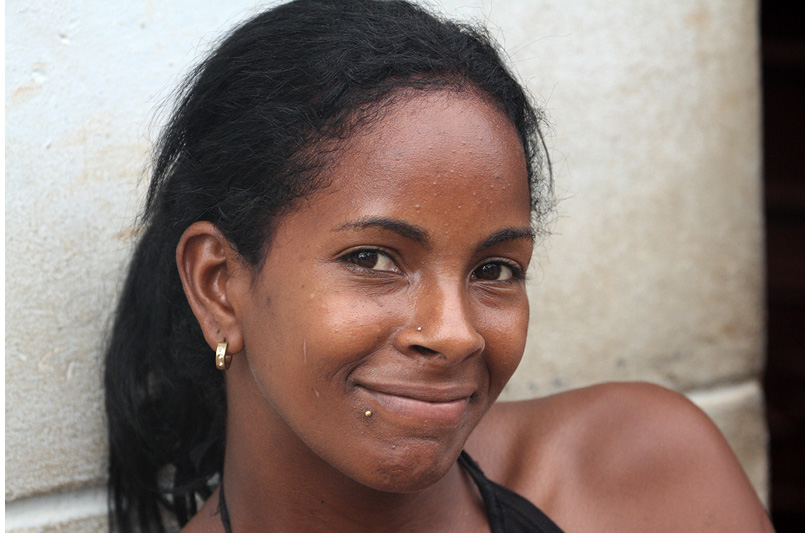
Our parting with la Habana was memorable. We were up before six in darkness. Just before we left, our kind señora appeared with two cortados (coffees) for us. It transpired that the driver she engaged for us was none other than her son, Adam. He plays double bass in a jazz and in a flamenco ensemble, though his favourite music is another coca-colonisation: rock. He took us down to the garage, where we squeezed into a 1986 Polski Fiat, which still has its original engine, unlike most of the dinosaurs.
Reading more into it than I should have, I asked him about the US flag next to the Cuban one on the dashboard. He replied that it was there when he bought the car. Adam told us that two years ago, casa particular owners had to pay $333 tax per month, regardless of whether they had paying guests or not. Now the tax is about half that much, but they are not likely to have tourists next month, due to the hurricanes.
Not far out, he stopped the car on the freeway, saying he needed petrol. I wondered where he would find a petrol station in the darkness. Instead, he opened the bonnet and produced a funnel and a container of petrol. The little car was struggling to get up the hills and at one point, while still driving, Adam opened his door to have a look at the rear. He stopped on the way to ask a man for directions to our terminal. Adam asked me to pay him before we reached the airport, as obviously this was an unofficial taxi, and the fare was a significant amount by Cuban standards.
The only problem with departure was exchanging our remaining pesos for dollars. I just had time to do this as boarding began.
Whereas we had zero problems with Cuban officialdom, our arrival in Buenos Aires was a production.
During the flight there was a barely audible announcement saying that Australians should contact the ground staff. We weren't sure what to do about it, so we just queued up at immigration with everyone else. When our turn came, the blonded seņora didn't know what to do with us. She disappeared with our passports into an office for ten minutes. When she returned she asked whether we were tourists, and then went off again. Some time later, she explained that the problem was the reciprocity fee, which we had not paid. So we paid it, but this did not resolve what she called "the problem".
Later, she took us to the office, where we were told to wait in a small holding room. We did not feel encouraged to see two Africans sitting there. After repeated attempts to get some sense out of the officials, we were told that the problem was that the airline officials had to do some paperwork related to the reciprocity fee. I had been to Argentina a number of times before. In the past I simply paid the fee on arrival, but the regulations changed a year ago.
I told Carla not to make a fuss, as one should not anger petty officials, or any officials for that matter. However, Carla's bowels had their own ideas, so she asked a lady official for the baņo. She made Carla wait for a few minutes then took her to a toilet and waited outside for Carla to finish. Carla felt like a prisoner.
I stood in the doorway, just so that they wouldn't forget about us. This had no effect because we were actually waiting for the Copal lady to "resolve the problem". We ended up waiting more than one and a half hours. All the other passengers had long gone and the staff had mostly left too.
When we did get out, the night air was a shock: 8 degrees. We were still dressed for Cuba. We got to the Claridge hotel just before midnight.
Welcome to democratic, or is it bureaucratic, Argentina!
October 2016
